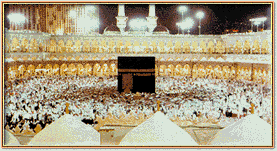Sallam,
As we are in the season of Hajj i.e. pilgrimage and it is the most sacred month to every one next to Ramadhan.
I thought of sharing some information in here to enlighten those who are not aware of the Importance of this month.
---------------------
Some Virtues of Hajj and Umrah
- The Prophet (pbuh) said: “Umrah is an expiation for the time between it and the previous ‘Umrah’ and an accepted Hajj has no less a reward than Paradise”. (Narrated by al-Bukhari 1683, Muslim 1349).
- The Prophet (pbuh) said: “He who performs Hajj and does not speak obscenely or commit evil then he returns just as the day his mother gave birth to him” (Narrated by Bukhaari, Ahmed, Nasai and Ibn Majah from Abu Hurairah).
- The Prophet (pbuh) said: “There is no day on which Allah frees more of His slaves from Fire than the Day of Arafah.” (Narrated Aisha, Ummul Mu’minin).
- The Messenger of Allah (pbuh) was asked which deed is the best? He said, “Belief in Allah and His messengers. He was asked, then what? He said, Jihad for the sake of Allah. He was asked, then what? He said, Hajj Mabrour (an accepted Hajj).” (Narrated by al-Bukhaari 26).
Types (Nusuk) of Hajj are Three:



2 comments:
When undertaking the pilgrimage, Muslims shed all signs of their wealth and societal distinctions by donning simple white garments, commonly called ihram. The required pilgrimage dress for men is two white cloths, one of which covers the body from the waist down, and one that is gathered around the shoulder. Women usually wear a simple white dress and headscarf, or their own native dress. The ihram is a symbol of purity and equality, and signifies that the pilgrim is in a state of devotion.
Umrah uk package
Your blog has really inspired me, I’m so happy to read this.
umra packages
Post a Comment